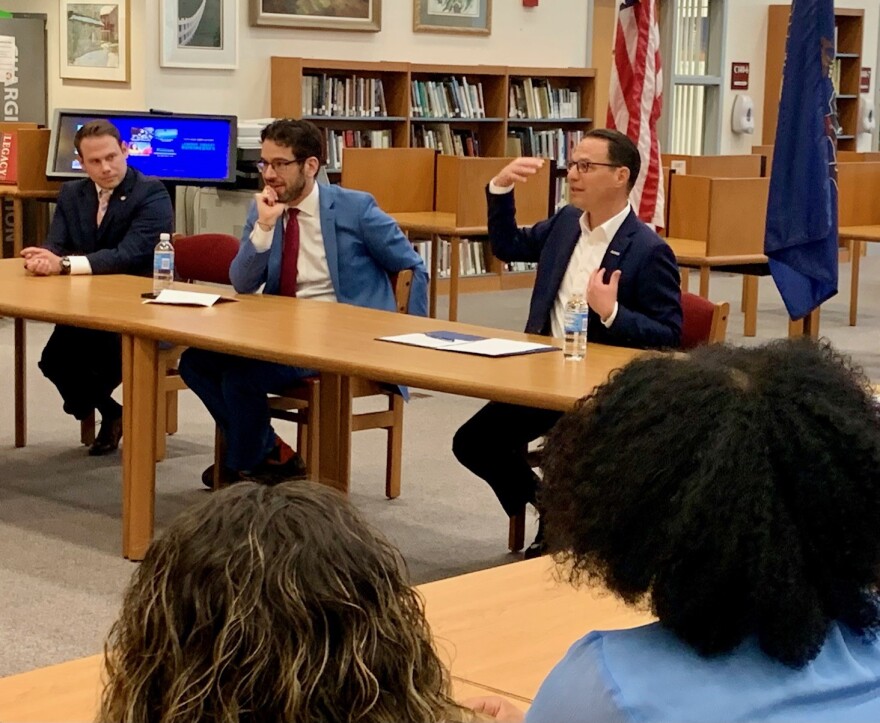SOUTH WHITEHALL TWP., Pa. — Pennsylvania Gov. Josh Shapiro said Wednesday that he wants to invest $500 million in mental health funding for schools over the next five years and up to $60 million a year in county mental funding by 2027-28.
In a visit to Parkland High School to highlight some proposed funding in his budget, Shapiro sat down with students from Parkland and Allentown School District's Dieruff and William Allen high schools to discuss emotional well-being and mental illness.
- Gov. Shapiro held a roundtable with students from Parkland and Allentown School Districts
- They discussed how to help teens in crisis
- Shapiro got complaints and suggestions on Safe2Say tip system
He also sought feedback from students on Safe2Say Something, the tip reporting system where students can anonymously report threats that he created as attorney general.
Shapiro said he wanted to come to listen to students in the Lehigh Valley area to make sure he was putting mental health funding in the areas it would help kids the most.
State Rep. Mike Schlossberg, D-Lehigh, and state Sen. Jarrett Coleman, R-Lehigh, also were in attendance.
“I think this issue transcends party lines and the silly politics that oftentimes divides us,” Shapiro said. “And what we’re focused on is commonsense solutions to a pressing problem that we need to combat right now.”
'You're fine ... get over it'
Parkland High Principal Nate Davidson said the school has counselors and crisis teams to help students who are having a psychological emergency.
"We constantly are being told that our hospitals don’t have enough psych beds, that there are not enough therapists and psychiatrists, that the waitlists are too long and that health insurance does not cover students’ therapy.”Parkland High School Principal Nate Davidson
“We are incredibly fortunate to have all of those resources available to our students,” Davidson said. “But our needs are consistent and growing.
"We constantly are being told that our hospitals don’t have enough psych beds, that there are not enough therapists and psychiatrists, that the wait lists are too long and that health insurance does not cover students’ therapy.”
To protect the privacy of students who participated in the roundtable, they were not publicly identified. The media was allowed in toward the end of the conversation.
Most of the youth said they would talk to their parents if they were in crisis. But one Allentown student said many of them came from immigrant families who endured wars and other struggles and would consider mental illness “minuscule.”
“You’re fine…get over it,” she said those parents would say.
Reporting system questioned, supported
Some students said the Safe2Say is abused by some students who call in false reports so school will get canceled.
Shapiro said The Safe2Say system is being abused only about 1% of the time.
“We're going to continue to fund the safe to say system actually increased funding for it, it works."Pennsylvania Gov. Josh Shapiro
“We're going to continue to fund the safe to say system actually increased funding for it, it works,” he said.
“I know the Attorney General's Office is working with local prosecutors to make sure that young people or others are held accountable if they issue a fake report, a false report, on Safe2Say. We need to protect the integrity of that platform.”
Some students said it would be helpful if the app connected students having a crisis to a therapist instead of having to wait to try to get in to see one in the office.
A Parkland student also said teachers needed more training on how to handle student mental health issues. She said content related to mental health was censored from the school newspaper.
Budget negotiations are continuing as state lawmakers work to finalize the next fiscal year budget.


